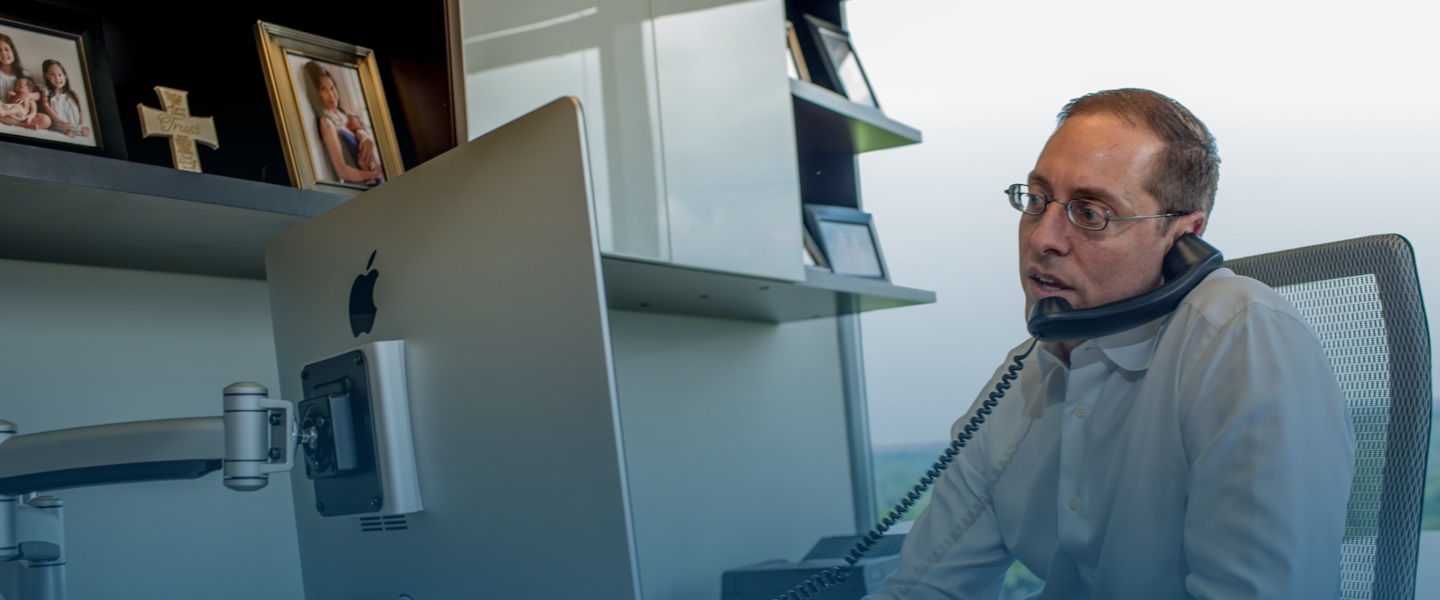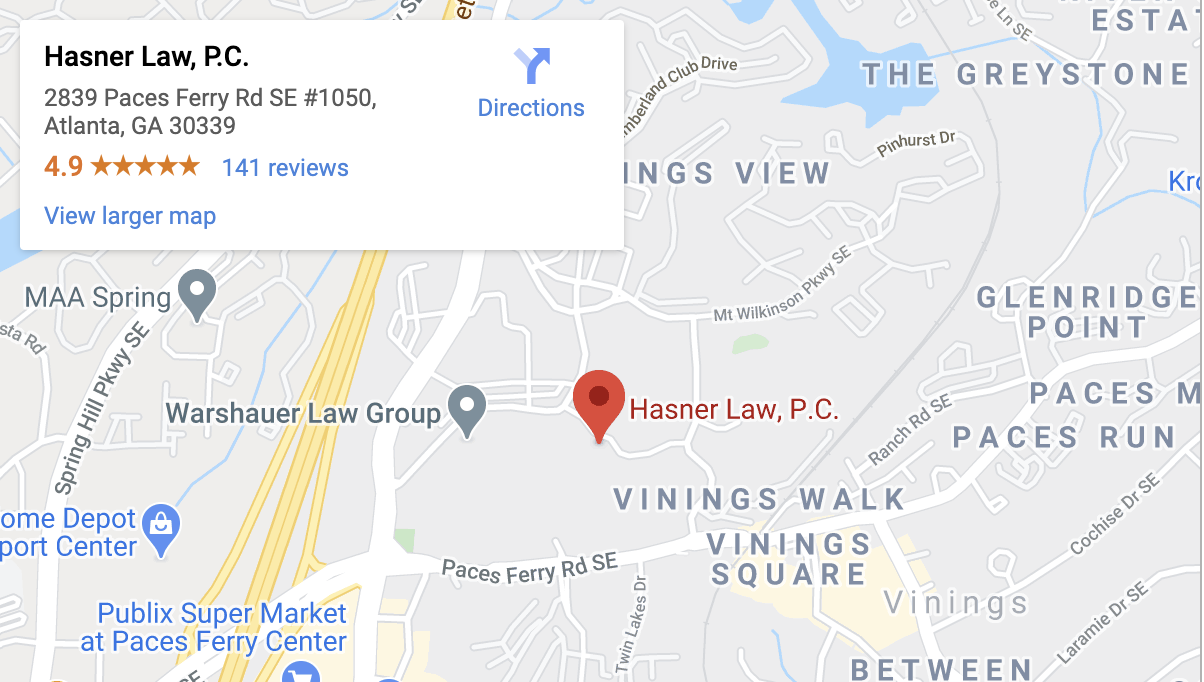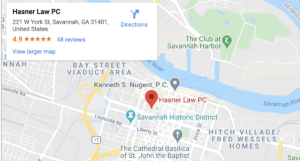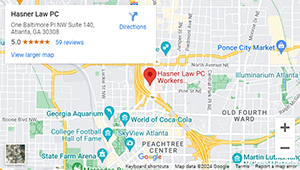Atlanta Product Liability Lawyer
Have you or a family member suffered an injury because of a defective or dangerous product in Atlanta, Georgia? You may be entitled to compensation from the manufacturer or company that sold it. Contact us to find out how our Atlanta product liability attorneys from Hasner Law Injury & Workers’ Compensation Attorneys, a personal injury law firm, can help you fight for the money you need and deserve. We offer a free consultation, so don’t hesitate to schedule a time to discuss your case with our law firm today.
We Handle All Product Liability Cases in Atlanta as a Personal Injury Law Firm

At Hasner Law Injury & Workers’ Compensation Attorneys, our skilled Atlanta personal injury lawyers represent clients in all types of product liability claims. The most common types we see involve dangerous or defective products such as:
- Toys
- Cars
- Automobile parts, including brakes and airbags
- Medical devices, including IVC filters, hernia mesh, and metal-on-metal hips
- OTC and prescription medications, including proton pump inhibitors and opioids
- Roundup weed killer and other pesticides
- Household items, and more.
In order to be successful in bringing a product liability claim, your case must meet the appropriate criteria. First, you must prove that the product had a defect that caused your injury. Next, you need to show that you were using the item as the manufacturer intended it to be used.
Note that, in most cases, it doesn’t matter if you are not the person who purchased the product. In other words, you would likely still have a claim even if you were injured by an item that was borrowed from a friend.
Now, a product can be considered defective for a variety of reasons. This will determine what law applies and the type of case that will be filed. Note that a single product can be defective for multiple reasons and cover more than one case type.
Manufacturing Defect
Often a product is designed correctly, but there is some glitch in the manufacturing process that makes it an unsafe or defective product harmful to the consumer. An example would be if you purchased a lawnmower with a blade that came off while you were mowing your lawn. If the blade was loose due to an assembly line issue, you may have a case based on a manufacturing defect.
Note that in order to be successful in your claim, you would need to show that the defect made the product unreasonably dangerous. For instance, if a similar manufacturing problem led to the lawnmower’s label peeling off, this would likely not be grounds for a lawsuit.
Defective Design

Sometimes, a product is manufactured according to design specifications, but the product is still considered unreasonably dangerous to the consumer. To be successful in this type of case, you must show that the risks inherent in the product design outweigh the benefits of the design.
These cases can be complex, but the courts have offered some guidance. Specifically, they will consider whether there was a reasonable design that would have been safer for the consumer. For instance, it is generally accepted that driving a vehicle poses some inherent risk of harm. Because of this, a manufacturer is not required to completely eliminate the danger.
However, if there is a type of vehicle design that is more prone to accidents, a manufacturer may be held liable if there is a safer design option available. An example would be if a manufacturer continues to design an SUV with a track record of rollovers despite there being a reasonable way to design a similar car that is less likely to roll over. These scenarios often involve product liability litigation due to the legal complexities surrounding defective design cases.
Failure to Warn or Provide Adequate Instructions
Note that a manufacturer has a duty to warn consumers about nonobvious and foreseeable dangers that could result from normal use of the product. For example, a tea kettle getting hot would likely be considered obvious and not require a warning.
By contrast, a laptop battery that gets warm enough to burn your skin would most likely need a warning label. This is because this level of heat is nonobvious, and it is foreseeable that a laptop would be put on the lap where skin may be exposed. Failure to provide such a warning could lead to a product liability lawsuit.
Potential Defendants to Products Liability Case
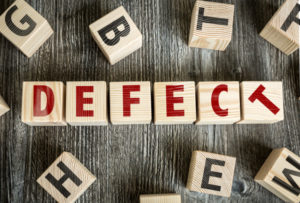
There are often many people and large corporations implicated in a products liability matter. This makes these types of cases highly complex, so it’s important to have experienced Georgia product liability lawyers on your side that can investigate everyone that was involved and determine who to bring a lawsuit against.
Sometimes, the responsible party is a foreign company. This is often the case when there is an issue in the chain of distribution. Now, a qualified products liability attorney can help you sort these matters out, but generally speaking, you can bring a case against all parties involved in the chain of distribution, including:
The Manufacturer
This includes the manufacturer of the whole product or an individual part. This is commonly the case with certain types of products where one company will make a particular component, such as a car steering wheel, and another company will assemble these items into a final product.
Note that under Georgia product liability law, manufacturers have strict liability. This means that you do not have to prove that they did anything wrong. Instead, you only need to show that the product was defective.
But, remember, you still have to prove that the defendant manufactured the product, that the product was defective when it left their control, and that this defective condition caused your injury.
Retailer
This refers to the store where you bought the item, whether this was through an online merchant or done in person.
The Wholesaler or Distributor
Acts as a middleman between the manufacturer and the retailer. Unlike manufacturers, sellers and distributors are not strictly liable. Instead, you have to show that they were in some way negligent. This is typically accomplished by evidence that the company knew the product was defective and sold it anyway.
Deadline for Bringing a Products Liability Case in Georgia
Note that Georgia law imposes strict deadlines on all product liability lawsuits. This is referred to as the statute of limitations, and it is generally two years for personal injury claims and four years for property damage claims. For that reason, it’s important to determine whether your case involves injury to your body or your property.
However, Georgia does have an exception to the statute of limitations rule that may apply to your case. In most cases, an injury and the product that caused the harm are discovered right away. But, sometimes, there is a delay that results in either the injury not manifesting itself for some time or a person not finding out about the harmful product until months or years have passed.
In these situations, Georgia law allows the statute of limitations clock to be paused or “tolled” until the victim discovers the injury and the product’s role in causing the harm. This is known as the discovery rule and it might apply in cases involving things like toxic chemicals or hazardous building materials.
But, keep in mind that the state also has what is known as a statute of repose. This law bars most claims that are not brought within ten years, even if a consumer does not discover the injury or the product that caused it within that time frame. Note that this rule does not apply to cases involving a manufacturer’s failure to warn.
Compensation for Products Liability Cases in Atlanta, GA
It’s important to note that you or your property must actually be harmed to have a case based on a defective product. This means that it’s not enough that the product was unreasonably dangerous. Personal injury attorneys play a crucial role in securing compensation for such cases, leveraging their experience and successful track record to help injury victims and their families.
Under Georgia law, the type of harm that you can receive compensation for is broad.
- Economic Damages: It includes things like medical expenses, damage to your property, lost income due to the injury, reduced earning capacity, and other economic losses.
- Non-Economic Damages: You may also be entitled to more subjective, non-economic damages. These would include things like pain and suffering or emotional anguish. If the injury resulted in the death of a loved one, the spouse or children of the victim may bring what is known as a wrongful death suit.
- Damages After a Fatal Accident: Damages for wrongful death include things like funeral/burial expenses, medical expenses incurred before death, and all income the victim would have earned during his or her lifetime. There may also be amounts awarded to represent loss of care and companionship.
What Happens If I’m Blamed For My Injury?
In some cases, a victim may be partially to blame for an injury from a defective product. An example would be if you used the product in a negligent way, such as running under a malfunctioning garage door. Note that this does not necessarily bar your claim completely. That’s because Georgia is a modified comparative fault state. You can recover compensation as long as you’re no more than 50% to blame for your injuries.
However, your damages will be reduced based on how much you were at fault. So, let’s say your case against the manufacturer would allow you to recover $100,000. If you were found 10% at fault, the most you could collect would be $90,000.
What to Do When You Have a Defective Product
It’s important to seek medical attention right away if you are injured by a defective product. If possible, keep the item as evidence and gather any information you have about where the product was purchased. Also, maintain a record of any discussions you had with the manufacturer or retailer.
Hold on to receipts, online purchase verifications, online chats, emails, and anything else that might help your case. Try to consult with an attorney before discussing anything with the manufacturer or accepting any settlement. The Consumer Product Safety Commission (CPSC) plays a critical role in regulating consumer products, so preserving the defective product as evidence is crucial.
Contact an Atlanta Product Liability Attorney to Get the Results You Deserve

If you were injured by a dangerous product, don’t hesitate to contact an Atlanta personal injury attorney in Fulton County. Our legal team knows how to negotiate with insurance companies and bring your case to trial if necessary. Call Hasner Law Injury & Workers’ Compensation Attorneys today at (678) 888-4878 or fill out a contact form for a free consultation to discuss your legal options.
Hasner Law Injury & Workers’ Compensation Attorneys – Atlanta Office
2839 Paces Ferry Road SE, Suite 1050
Atlanta, GA 30339
P: (678) 888-4878

